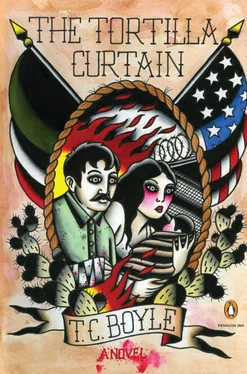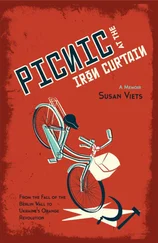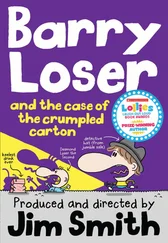T. Boyle - The Tortilla Curtain
Здесь есть возможность читать онлайн «T. Boyle - The Tortilla Curtain» весь текст электронной книги совершенно бесплатно (целиком полную версию без сокращений). В некоторых случаях можно слушать аудио, скачать через торрент в формате fb2 и присутствует краткое содержание. Год выпуска: 2011, Издательство: Penguin Books, Жанр: Современная проза, на английском языке. Описание произведения, (предисловие) а так же отзывы посетителей доступны на портале библиотеки ЛибКат.
- Название:The Tortilla Curtain
- Автор:
- Издательство:Penguin Books
- Жанр:
- Год:2011
- ISBN:нет данных
- Рейтинг книги:4 / 5. Голосов: 1
-
Избранное:Добавить в избранное
- Отзывы:
-
Ваша оценка:
- 80
- 1
- 2
- 3
- 4
- 5
The Tortilla Curtain: краткое содержание, описание и аннотация
Предлагаем к чтению аннотацию, описание, краткое содержание или предисловие (зависит от того, что написал сам автор книги «The Tortilla Curtain»). Если вы не нашли необходимую информацию о книге — напишите в комментариях, мы постараемся отыскать её.
The Tortilla Curtain — читать онлайн бесплатно полную книгу (весь текст) целиком
Ниже представлен текст книги, разбитый по страницам. Система сохранения места последней прочитанной страницы, позволяет с удобством читать онлайн бесплатно книгу «The Tortilla Curtain», без необходимости каждый раз заново искать на чём Вы остановились. Поставьте закладку, и сможете в любой момент перейти на страницу, на которой закончили чтение.
Интервал:
Закладка:
“I agree,” Delaney said quickly. “Couldn't agree more. The idea of a wall is completely and utterly offensive and it's not going to be cheap, that's for sure.”
“No-and that's what I'm emphasizing with these people. Nobody wants to see their assessment go up, right?” If he'd been beaming a moment ago, Todd Sweet looked positively reverential now. It was a look Delaney knew well, a California look, composed in equal parts of candor, awe and dazzlement, and it usually presaged the asking of a small favor or a tiny little loan. “Look,” Todd Sweet said finally, “I wonder if I might stop by your place tonight and maybe we could write something up, together, I mean-I hate to say it, but I'm no writer-”
And then something came over Delaney-right there in the street, under the sun-a slow wash of shame and fear, a bitter stinging chemical seepage that carried with it the recollection of the Mexican in the bushes, the stolen car, Sunny DiMandia, Jim Shirley, the Metro section and all the rest. He had a vision then of all the starving hordes lined up at the border, of the criminals and gangbangers in their ghettos, of the whole world a ghetto and no end to it, and he felt the pendulum swing back at him. There would be war in his living room if he actively opposed this wall, war with his wife and with Jack and his triumvirate of Cherrystone, Shirley and Flood. Was he willing to risk that? Did the wall really matter all that much?
Todd Sweet was studying his face, the eyes harder now, more penetrating, the mask slipping. “If it's too much trouble,” he said, “I mean, if you want to live in a walled city like something out of 'The Masque of the Red Death,' that's your prerogative, but I just assumed…” He trailed off, a thin petulant edge to his voice.
“No, no, that's not the problem,” Delaney said, and why shouldn't he defy Kyra and Jack and stand up for what he believed in? But then he saw that phantom car again, the one with the rumbling speakers and impenetrable windows, and he hesitated. “Look,” he said, “I'll call you,” and turned to walk away.
“Seven-one-three, two-two-eight-zero,” Todd Sweet called at his back, but he wasn't listening, his mind gone numb with ambivalence. He went on up the block, barely registering the world spread out before him, glum, dogless, on his own. Nothing was moving. The sun was everything. And then he turned into his own street, Piñon Drive, and saw that life existed after all: another figure was drifting across that static landscape in the blast of late-summer heat. He couldn't be sure, but it seemed to be the bipedal figure of a man, slipping through the heat haze like an illusion, legs scissoring the light. The man had a white cloth shoulder bag slung over one arm, Delaney saw as he came closer, and he was crossing the Cherrystones' lawn with the lingering insouciant stride of the trespasser-which is what he must have been, since Delaney knew for a fact that the Cherrystones had gone to Santa Monica and wouldn't be back till seven. And then Delaney came closer still, and noticed something else, something that struck him with the force of a blow: the man was Mexican. “Hey,” Delaney called out, quickening his stride now, “can I help you?”
The man looked startled, looked guilty-caught in the act-and he just stood there on the lawn and let Delaney come up to him. And now the second surprise: Delaney knew him, he was sure he did. It took him a minute, something missing from the composite, but then, even without the baseball cap, Delaney recognized him: this was the hiker, the illegal camper, the man who'd soured the first half of one of the worst days of Delaney's life. And even then, even in that moment of recognition, the net widened suddenly: didn't Kyra say that the man who'd threatened her at the Da Ros place was wearing a Padres cap turned backwards? The man just stood there, guarding his satchel. He didn't look away from Delaney's gaze, and he didn't respond.
“I said, can I help you?”
“Help me?” he echoed, and his face broke into a grin. He winked an eye. “Sure,” he said, “sure, _hombre,__ you can help me.” And then: “What's happening, man?”
Delaney was hot. He was uncomfortable. He was aggravated. The man stood a good three or four inches taller than he did and he was letting Delaney know just how unimpressed he was-he was mocking him, bearding Delaney right there in his own community, right there on his own street. Camping in the state park was one thing, but this was something else altogether. And what was in the satchel and why had he been crossing the Cherrystones' lawn when the Cherrystones weren't at home?
“I want to know what you think you're doing here,” Delaney demanded, eyeing the satchel and imagining the Cherrystones' silverware in there, their VCR, Selda's jewelry. “This is private property. You don't belong here.”
The man looked right through him. He was bored. Delaney was nothing, a minor annoyance, a gnat buzzing round his face.
“I'm talking to you,” Delaney said, and before he could think, he had hold of the man's forearm, just above the wrist.
The tan eyes looked down at Delaney's hand, then up into his face. There was nothing in those eyes but contempt. With a sudden violent jerk, the man whipped his arm free, gathered himself up and spat scornfully between Delaney's feet. “I got these flies,” he said, and he was almost shouting it.
Delaney was riding the crest of the moment, trembling, angry, ready for anything. The man was a thief, a liar, the stinking occupant of a stinking sleeping bag in the state forest, a trespasser, a polluter, a Mexican. “Don't give me that shit!” Delaney roared. “I'm calling the police. I know what you're doing up here, I know who you are, you're not fooling anybody.” Delaney looked round him for support, for a car, a child on a bike, Todd Sweet, anyone, but the street was deserted.
The Mexican's expression had changed. The mocking grin was gone now, replaced by something harder, infinitely harder. He's got a knife, Delaney thought, a gun, and he went cold all over when the man reached into the satchel, so keyed up he was ready to spring at him, tackle him, fight to the death… but then he was staring into a flat white sheet of Xerox paper crawling with print. “Flies,” the man spat at him. “I deliver these flies.”
Delaney took a step back, so devastated he couldn't speak-what was happening to him, what was he becoming? — and the man shoved the flier into his hand and stalked away across the lawn. He watched, stupefied, as the Mexican headed up the street, carrying his shoulders with rage and indignation, watched as he strode up to Delaney's own house and inserted a flier in the slit between the screen door and the white wooden doorframe. Then, finally, Delaney looked down at the sheet of paper in his hand. A SPECIAL MESSAGE FROM THE PRESIDENT OF THE ARROYO BLANCO ESTATES PROPERTY OWNERS' ASSOCIATION, it read in block letters across the top. And then, beneath it: “I urge all of you to attend Wednesday's meeting on an issue vital to the security and well-being of us all…”
7
THE FIRST FIFTEEN MINUTES WERE NOTHING. AMéRICA never asked herself what she was doing sitting on that concrete wall out front of the post office building in Canoga Park, never gave it a thought. She was exhausted, her feet ached, she felt hot and sleepy and a little nauseous, and she just sat there in a kind of trance and let the rich stew of the city simmer around her. It was amazing, all this life. The sidewalks weren't crowded, not in the way she'd expected, not like in the market in Cuernavaca or even Tepoztlán, but there was a steady flow of people going about their business as if it were the most natural thing in the world to live here. People were walking dogs, riding bicycles, pushing babies in strollers, carrying groceries in big paper sacks cradled to their chests; they were smoking, chatting, laughing, tilting back their heads to drink from red-white-and-blue cans of Pepsi that said “Uh-huh!” on the label.
Читать дальшеИнтервал:
Закладка:
Похожие книги на «The Tortilla Curtain»
Представляем Вашему вниманию похожие книги на «The Tortilla Curtain» списком для выбора. Мы отобрали схожую по названию и смыслу литературу в надежде предоставить читателям больше вариантов отыскать новые, интересные, ещё непрочитанные произведения.
Обсуждение, отзывы о книге «The Tortilla Curtain» и просто собственные мнения читателей. Оставьте ваши комментарии, напишите, что Вы думаете о произведении, его смысле или главных героях. Укажите что конкретно понравилось, а что нет, и почему Вы так считаете.












